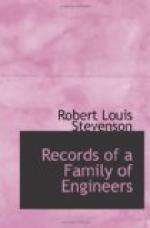It is plain there is here but a restricted use for formulas. In this sort of practice, the engineer has need of some transcendental sense. Smeaton, the pioneer, bade him obey his ‘feelings’; my father, that ’power of estimating obscure forces which supplies a coefficient of its own to every rule.’ The rules must be everywhere indeed; but they must everywhere be modified by this transcendental coefficient, everywhere bent to the impression of the trained eye and the feelings of the engineer. A sentiment of physical laws and of the scale of nature, which shall have been strong in the beginning and progressively fortified by observation, must be his guide in the last recourse. I had the most opportunity to observe my father. He would pass hours on the beach, brooding over the waves, counting them, noting their least deflection, noting when they broke. On Tweedside, or by Lyne or Manor, we have spent together whole afternoons; to me, at the time, extremely wearisome; to him, as I am now sorry to think, bitterly mortifying. The river was to me a pretty and various spectacle; I could not see—I could not be made to see—it otherwise. To my father it was a chequer-board of lively forces, which he traced from pool to shallow with minute appreciation and enduring interest. ’That bank was being under-cut,’ he might say. ’Why? Suppose you were to put a groin out here, would not the filum fluminis be cast abruptly off across the channel? and where would it impinge upon the other shore? and what would be the result? Or suppose you were to blast that boulder, what would happen? Follow it—use the eyes God has given you—can you not see that a great deal of land would be reclaimed upon this side?’ It was to me like school in holidays; but to him, until I had worn him out with my invincible triviality, a delight. Thus he pored over the engineer’s voluminous handy-book of nature; thus must, too, have pored my grand-father and uncles.
But it is of the essence of this knowledge, or this knack of mind, to be largely incommunicable. ‘It cannot be imparted to another,’ says my father. The verbal casting-net is thrown in vain over these evanescent, inferential relations. Hence the insignificance of much engineering literature. So far as the science can be reduced to formulas or diagrams, the book is to the point; so far as the art depends on intimate study of the ways of nature, the author’s words will too often be found vapid. This fact—that engineering looks one way, and literature another—was what my grand-father overlooked. All his life long, his pen was in his hand, piling up a treasury of knowledge, preparing himself against all possible contingencies. Scarce anything fell under his notice but he perceived in it some relation to his work, and chronicled it in the pages of his journal in his always lucid, but sometimes inexact and wordy, style. The Travelling Diary (so he called it) was kept in fascicles of ruled




